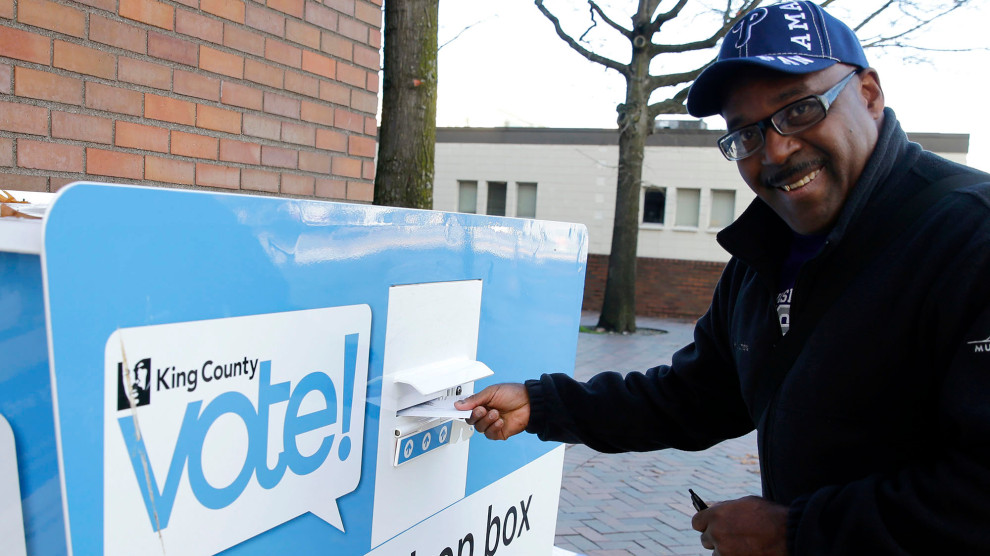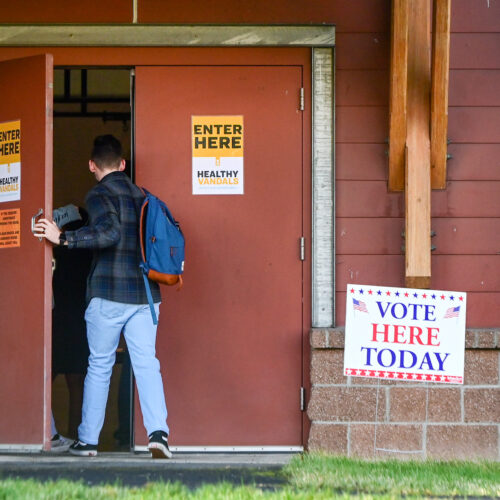
Concerned About Voting Security? Northwest Election Chiefs Say They Have Confidence
Listen
Amid warnings that Russian hackers may try to interfere in the 2018 midterm elections, top election officials in the Northwest say they are taking additional steps to protect voting systems from attack.
But Washington Secretary of State Kim Wyman, a Republican, said Thursday her biggest concern is the impact on public confidence in elections.
“Our job is confidence in the election, confidence that the fairness and the integrity of the election were in place and that the winner was the people’s choice,” Wyman said in an interview on TVW’s “Inside Olympia” program. “And I think the biggest threat in my mind right now is that public confidence.”
Oregon Secretary of State Dennis Richardson, also a Republican, has warned that the country is in the midst of an “information war.” In a release last month titled “How Secure are Oregon Elections,” Richardson wrote that transparency is the best response to concerns about election integrity.
He also noted that Oregon, like Washington, is a vote-by-mail state that relies on paper ballots. “I want you to know that you can be confident in our election system and paper can’t be hacked,” Richardson wrote in his release.
Last month, both Richardson and Wyman attended a briefing in Washington, D.C., held by staff from the Office of the Director of National Intelligence, the Department of Homeland Security and the FBI. The topic was cyber security as it relates to elections. Richardson said in his release that the briefing focused on the indictment of 13 Russians in an alleged scheme to interfere in the 2016 election as part of an effort to help Donald Trump’s presidential campaign.
Wyman added that the briefing took place at a secret location, but said the information shared was limited.
“Most of what I learned we didn’t find surprising, it wasn’t new information,” Wyman said.
Wyman and other state elections officials have complained about a lack of timely sharing of intelligence information from the federal government. For instance, it took until last September for the Department of Homeland Security to confirm that Washington, Oregon and 19 other states were targeted by Russian hackers during the lead-up to the 2016 election. Only Illinois’ voter registration system was actually breached.
Wyman said part of the problem is a culture difference between election officials and intelligence officials who are still learning to work together.
“Our world is transparent and that’s probably the biggest learning curve I think for Homeland Security, is them understanding we have to share things with the public,” Wyman said.
In 2017, the Homeland Security Department declared the nation’s election systems as critical infrastructure similar to the power grid. Currently, Wyman and three of her staff are waiting to receive special national security clearances to give them access to more classified intelligence about election hacking.
As the 2018 election approaches, Wyman said her focus is on further hardening the state’s systems and working closely with local election officials throughout Washington’s 39 counties.
“We’re really going to put an emphasis in this next year on training for our staff and for the county staff to be aware of what things put your system at risk,” Wyman said.
Wyman gave the example of voter tabulation machines which are not connected to the internet for security reasons. But that requires county election staff to use thumb drives to pull the election results off the machines. Wyman said it’s important that county officials use a new thumb drive each time and never re-use a thumb drive. The state will also guide counties in tabletop exercises based on actual hacking scenarios.
Wyman noted that this week Washington state learned it will receive approximately $8 million from the federal government to help pay for cybersecurity upgrades and to replace aging voter equipment.
The Washington Secretary of State’s Office also plans to partner with the Washington National Guard’s cybersecurity program to simulate cyberattacks and test for weaknesses in critical computer-based systems.
Longer term, the state is preparing to replace its elections management and state voter database systems in time for the 2020 elections.
In Oregon, Richardson said his office continues to evaluate and improve security measures.
“I am confident that Oregon’s voting system is a national leader in cybersecurity and protection from malicious outside intrusions,” Richardson wrote in his February memo to voters.
Copyright 2018 Northwest News Network
Related Stories:

Washington state bill could strengthen regulations, increase fines for ‘troublesome’ landfills
While hiking, Nancy Lust, with Friends of Rocky Top, watches a truck dump waste into a landfill in Yakima County. Lust lives near the landfill and has fought to learn

This bill could give Washington tribes, communities more say in wind, solar development
A new bill making its way through the Washington Legislature would require county and tribal approval for new wind and solar projects that go through the state’s Energy Facility Site

University of Idaho polling location sees Election Day difficulty
Huge voter turnout and same-day registration caused long delays at UI Student Rec Center















